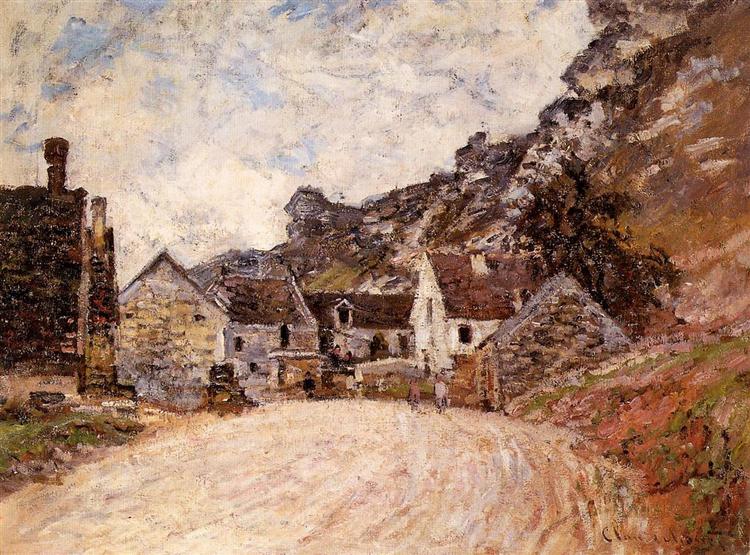Description
The Village of Chantemesie at the Foot of the Rock, painted in 1880 by Claude Monet, is a work that encapsulates the essence of the Impressionist movement and the artist's technical mastery. This painting is a clear example of Monet's approach to the representation of nature and its nuances. In the work, the viewer is taken to a rural landscape, where the village of Chantemesie is located in an almost idyllic setting, surrounded by the opulence of vegetation and the majesty of cliffs rising in the background. This contrast between the tranquility of the village and the strength of the rock creates a visual balance that invites contemplation.
Monet uses a color palette that ranges from deep greens to soft blues to warm earth, achieving a harmony that is characteristic of his style. Light, a primary element in Monet’s work, is reflected in the surface of the water that bathes the lower part of the painting. The way the colors blend and are applied with loose brushstrokes demonstrates the artist’s impressionistic technique, allowing the painting to capture not only the image of the village, but also the atmosphere and liveliness of the moment depicted. The trees, with their glossy leaves, seem to vibrate with the sunlight, communicating a sense of life and movement.
The landscape is apparently uninhabited, which gives it a feeling of peace and solitude, although it is not devoid of human presence. Some buildings can be seen in the village, a recurring feature in several of Monet's paintings from that period that depict rural life. This approach to the rural also reflects the interest of Impressionism in everyday life and natural landscapes, which undoubtedly contrasted with the industrial progress that was beginning to encompass Europe during the 19th century.
Through this painting, Monet not only makes a visual representation, but also establishes a dialogue with nature. The work is set in a context where Impressionism sought to capture the subtleties of changes in light and atmosphere, a challenge that Monet embraced with enthusiasm. His choice of a location such as Chantemesie, a village located in Normandy, also has personal resonances, given his love of nature and its landscapes, which he would often explore in his production.
The Village of Chantemesie at the Foot of the Rock resonates with the history of Impressionism in its fullness, becoming a testament to Monet’s artistic experiment and his quest to capture not just the image, but also the experience and emotion of place. This work is a brilliant example of how art can transcend mere representation and achieve a visceral effect on the viewer, evoking not just a landscape, but also a sense of place and belonging in the spirit of the time.
KUADROS ©, a famous painting on your wall.
Hand-made oil painting reproductions, with the quality of professional artists and the distinctive seal of KUADROS ©.
Painting reproduction service with satisfaction guarantee. If you are not completely satisfied with the replica of your painting, we will refund 100% of your money.

